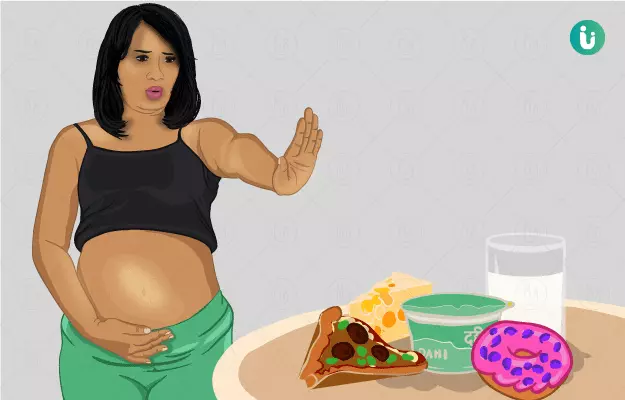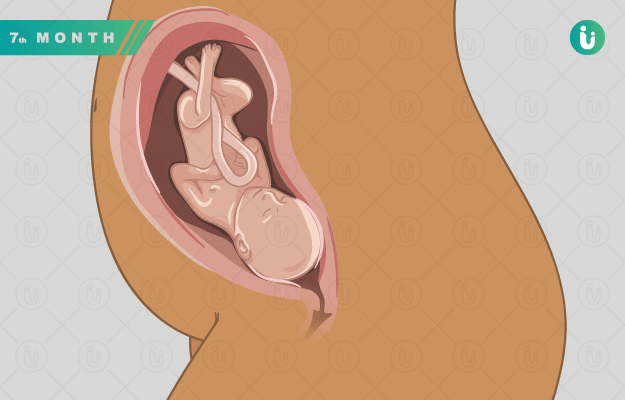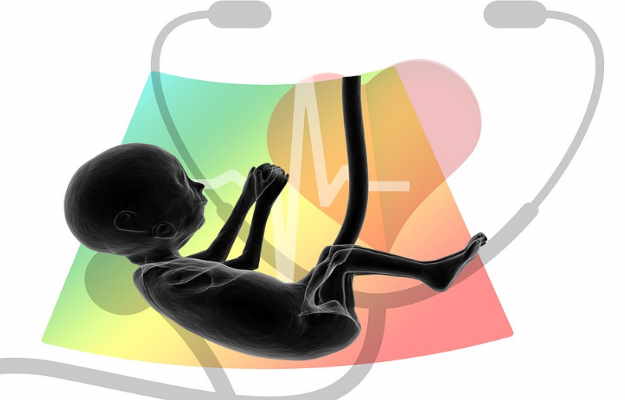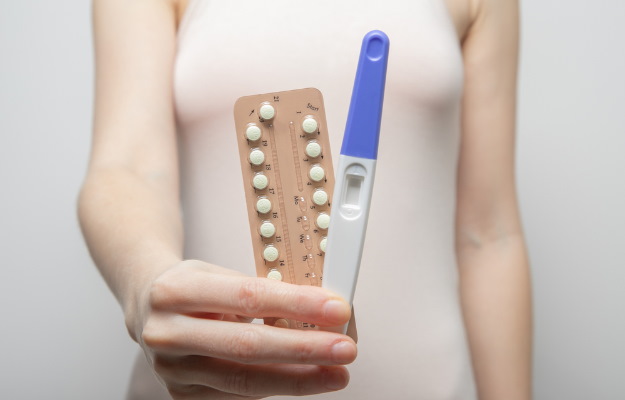Gaining adequate weight during pregnancy is a sign that you are eating enough food for the baby. Depending on your weight before getting pregnant, the normal weight gain should be between 11 to 15 kg.
During the first trimester, when "morning sickness" is at its peak, it is normal to gain only one to two kg (or sometimes lose weight). At this time, the fetus is so small that it does not require much nutrition. So once you start taking prenatal vitamins, all the requirements of the fetus are met with it. After the first trimester, the weight gain is about 500 grams every week. If your appetite has not increased even in the second trimester or if you are not gaining the expected weight in the third trimester, consult your doctor for a pregnancy diet chart. The good news is that most women solve this problem in some way.
This article explains the causes and remedies for loss of appetite during pregnancy that will surely help you in this situation -
(Read more - Every Mother Should Know : Pregnancy Problems)
- Loss Of Appetite During First Trimester
- Loss Of Appetite During Second Trimester
- Loss Of Appetite During Third Trimester
- Summary
Loss Of Appetite During First Trimester
Loss of appetite during pregnancy is often accompanied by nausea and vomiting, affecting 70 to 85 percent of pregnant women. Morning sickness is your body's response to protect the fetus from potentially harmful foods. Rising levels of hormones (including estrogen and the pregnancy hormone hCG) also play a role in nausea and increasing your sensitivity to food. They also cause a bad taste in your mouth.
Tips:
- Drink plenty of fluids. Aim to drink eight glasses of fluids (water or lemonade or ginger tea) throughout the day.
- Don't overeat. Eat small meals six times a day, rather than three large meals a day.
- Eat lightly. Eat as much protein and carbohydrates as possible which keep your blood sugar stable and make you feel full. Eat bananas. Also consume yogurt for calcium and protein.
- Avoid strong-smelling foods. These include spicy and fatty foods.
- When women are pregnant, they prefer cold food and drinks over hot. Of course, some like hot too. But this is rare.
- Take prenatal vitamins and brush your teeth daily. Ideally, start taking vitamins at least a month before conception.
- To deal with nausea etc., seek the help of a doctor.
(Read more - Overdue Pregnancy)
Loss Of Appetite During Second Trimester
For many women, this is the best time of pregnancy because at this time your stomach does not look like a watermelon, and many women also get their appetite back. At this time, you may actually feel twice as hungry. Eventually, you feel more hungry during these days.
Tips:
To meet your nutrient requirements in this trimester, consume calcium (1,000 mg per day), protein (75 mg per day), folate (which can be obtained from high-fiber foods like legumes and green leafy vegetables but may cause constipation after some time) and omega 3 rich foods like fish (which increases the baby's brain power).
If you still feel lethargic or sick, drink plenty of water as you did in the first trimester, eat small amounts of food, avoid eating strong-smelling tasty foods, and take prenatal vitamins so that you and your baby get all the nutrients.
(Read more - How to Take Care of Yourself After a C-Section)
Loss Of Appetite During Third Trimester
During the last months of pregnancy, nausea stops and your stomach starts growing day by day. Your appetite has fully returned, but you start feeling full after eating just a few bites. The uterus leaves little space for the stomach as well as the other organs. This displacement causes heartburn. Constipation caused by hormones can slow things down, meaning you will feel full again. While hunger is less common in the third trimester compared to the first trimester, it is important to manage your diet and nutrition in this trimester as well.
(Read more - How To Take Care During Pregnancy)
Tips:
- Just like you used to eat small amounts during the first twelve weeks, eat small amounts of food several times throughout the day. Ultimately, you have to fill your stomach with enough nutrients. Especially now that your nausea is gone, eat everything other than just calorie-rich foods. Try to incorporate new nutrients into your diet, such as cottage cheese, yogurt, and fruit salads.
- Eat fiber. Try to eat plenty of fiber-rich foods. Leafy greens, whole-grain bread, avocado, asparagus, and sunflower seeds are good for reducing constipation and keeping all systems functioning.
- As in the first trimester, drink plenty of fluids and take prenatal vitamins. You should usually make a list of what to eat and what not to eat during pregnancy.
(Read more - Should Probiotics Be Taken During Pregnancy?)
Summary
There are many reasons for loss of appetite during pregnancy. Hormonal changes, such as increased progesterone levels, are a major cause of loss of appetite. In addition, nausea, vomiting, and fatigue of a pregnant woman can also affect appetite. Increased abdominal pressure and changes in the digestive system can also cause loss of appetite. Mental stress and anxiety can also contribute to a loss of appetite. To manage this condition, eat small meals, consume healthy snacks, and keep meal times regular. Consulting a doctor can also help in getting the right guidance.
































